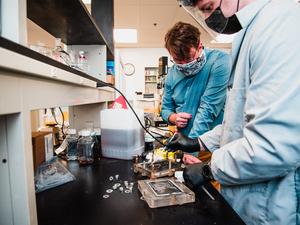
The UMass Lowell Research Institute, an emerging-technology hub for defense research and commercialization, is boosting its early-stage startup services with a new team member.
Northstar Campus, a division of the institute created to accelerate early-stage technologies, named Alex Brickner as its new director of the Small Business Innovation Research (SBIR) Center of Excellence. Brickner will work with entrepreneurs to access federal Department of Defense resources, including funding from the government’s SBIR and Small Business Technology Transfer (STTR) programs, which support innovative research and workforce development.
Matthew McSwain, the executive director of UMass Lowell Research Institute, helped launch the institute four years ago. He said one of its priorities is connecting small businesses to government funding and contracts and accelerating their growth.
“Until us, there really was no specific place to go to get this type of expertise and full wraparound services for specifically DOD,” McSwain said.
Brickner said his prior experience as a startup executive will help him guide other young companies in his new role. In 2017, Brickner co-founded a company to facilitate information sharing between the government, military and private parties during emergencies. He served as SimpleSense’s chief product officer until late 2021, when Brickner said he had the opportunity to join Northstar and “the company decided to go in a different direction.”
After entering the government sector through a military accelerator, Brickner helped secure U.S. Air Force funding and several military contracts for SimpleSense for a total of around $18 million.
“The biggest challenge that entrepreneurs face entering into this ecosystem is figuring out what they need to do in order to work with the government,” Brickner said.
Terminology translation
Navigating government programs and their terminology is like learning a new language, Brickner said, and each has its own specific compliance requirements. His job will be to understand these rules and help companies adapt their grant proposals to meet them.
Brickner also plans to advise founders on the technical aspects of their proposals, network with government stakeholders and hire talent as they scale their businesses.
“In many ways, it feels like a continuation of the work I did as an entrepreneur because I’m still tapping into a lot of people that I used to converse with back at my former company,” he said.
Massachusetts ranked 8th in the country for total Department of Defense funding in the 2020 fiscal year, moving up from 10th place in 2019. The state saw $18.6 billion in total defense spending for procurement and personnel.
At the institute, McSwain said they have supported more than 160 companies and have a 53% win rate for funding. For many of these companies, this is the first government funding they’ve secured.
“We’ve had some pretty good successes because of our very mature entrepreneur innovation ecosystem,” McSwain said. “Companies now have a place to come to for help to them get across that threshold and to have a place to call home.”








